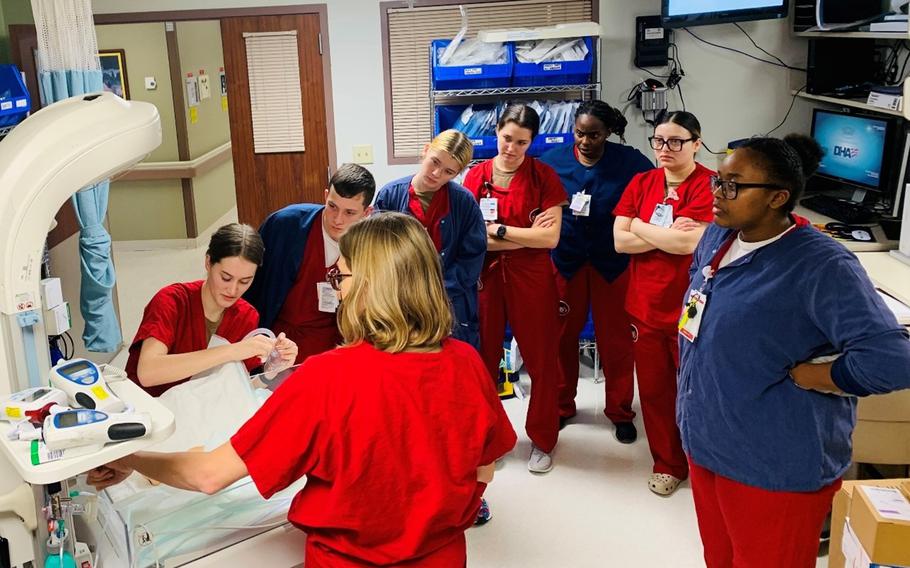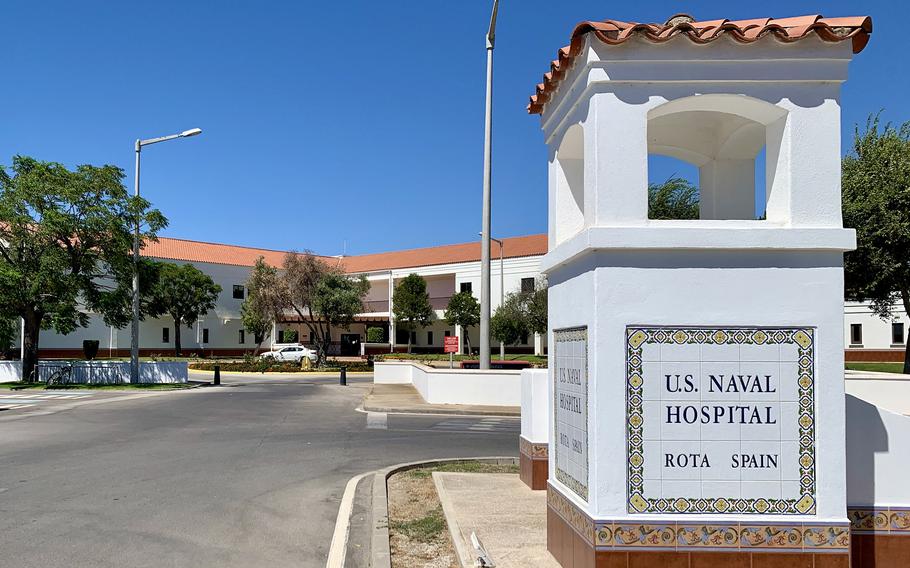
Lt. Christina Acosta, a labor and delivery nurse on the Naval Hospital Rota Multiservice Ward, demonstrates newborn resuscitation procedures at the U.S. Naval Hospital Rota in Spain, March 1, 2024. The hospital has stopped delivering babies because the local ambulance service provider’s response time is insufficient. (U.S. Navy)
NAPLES, Italy — One of the few U.S. military bases in Europe able to care for pregnant women through birth has stopped delivering babies, instead referring all labor and delivery patients to local hospitals.
U.S. Naval Hospital Rota in Spain began temporarily referring all expectant mothers, including service members, to off-base doctors and hospitals last month.
That action came as Rota medical officials grew concerned about an increased neonatal emergency transport time after the hospital’s ambulance provider moved about five hours away, said Whitney Trimble, a spokeswoman for Defense Health Network-Europe.
“Obviously, when we’re dealing with any kind of emergency transfer to our most vulnerable patients … we want to make sure that we get them the care they need as quickly as possible,” said Trimble, who characterized the switch as cautionary.
The appropriate response time varies depending on the emergency, Trimble said.
But unexpected complications such as prematurity, breathing difficulties and other problems that arise during childbirth require quick transfer to a larger medical facility equipped to offer specialized treatment to newborns and their mothers. The hospital at Naval Station Rota doesn’t have a neonatal unit.
It wasn’t clear how long the hospital, which delivers about 100 babies a year, will divert obstetrics patients elsewhere.
Defense Hospital Network-Europe is working with the Tricare overseas program contractor and Spain to identify alternative neonatal transport options, said Trimble, adding that it isn’t uncommon for overseas military bases to refer pregnant women off base for care.
Only three other military hospitals in Europe — Landstuhl Regional Medical Center in Germany, the 48th Medical Group in the U.K. and U.S. Naval Hospital Naples — have in-house obstetrics capabilities. Those facilities aren’t diverting pregnant patients for care off base, she said.

U.S. Naval Hospital Rota in Spain, seen here in August 2022, is temporarily diverting all pregnant patients to local hospitals for labor and delivery services. The hospital says the diversion is needed because its local neonatal transport provider moved about five hours away from the base, increasing its response time to emergencies. (Alison Bath/Stars and Stripes)
Rota’s example comes about a year after the medical clinic at Kadena Air Base on Okinawa abruptly announced that all women expected to deliver their babies between August and December 2023 would have to return to the U.S. or have their child at a Japanese hospital. The clinic cited staffing shortages at U.S. Naval Hospital Okinawa in making the announcement.
Two days later, defense health officials reversed course, saying that the clinic would continue to provide full labor and delivery service for all eligible beneficiaries.
At Rota, most pregnant women eligible for care at the Navy hospital can still receive prenatal care there until they reach their 36th week of pregnancy. The cutoff varies for women whose pregnancies are considered high-risk due to complications such as high blood pressure or diabetes, depending on the advice of their care provider.
The Navy hospital works with pregnant patients to transfer their care to one of two medical facilities, each about 30 minutes from the base. They include translation and other support services to ensure the comfort and safety of patients, Trimble said.
“Nurse Case Managers check in daily with (obstetrics) patients referred to local hospitals and assist in transitioning the mother and child back to the (Rota hospital) for care after being (delivered),” Trimble said in a statement.
For Tomomi Williams, the unexpected change brought concerns about a language barrier when delivering her third child. Williams, who is Japanese, speaks English but does not speak Spanish.
That worry was quelled with the help of a translator and care she received while delivering her third child last month at a Spanish hospital, said Williams, who is married to an active-duty sailor.
While having her daughter, Williams wanted hospital staff to give her an injection to ease the discomfort of labor pains. The Spanish medical team refused, saying it would be better to offer the treatment after Williams’ labor progressed further.
In the end, that determination made having her baby much easier, said Williams, who admitted she was initially annoyed but later happy with the decision.
Overall, Williams rated the care she received as very good but warned other pregnant women to expect some cultural differences when having their babies at a Spanish hospital.
They may share a room with other women in labor until they deliver, and Spanish nurses won’t “come to you unless you call them, but that doesn’t mean they don’t want to help you,” Williams said. But when you call them, “they are very helpful.”